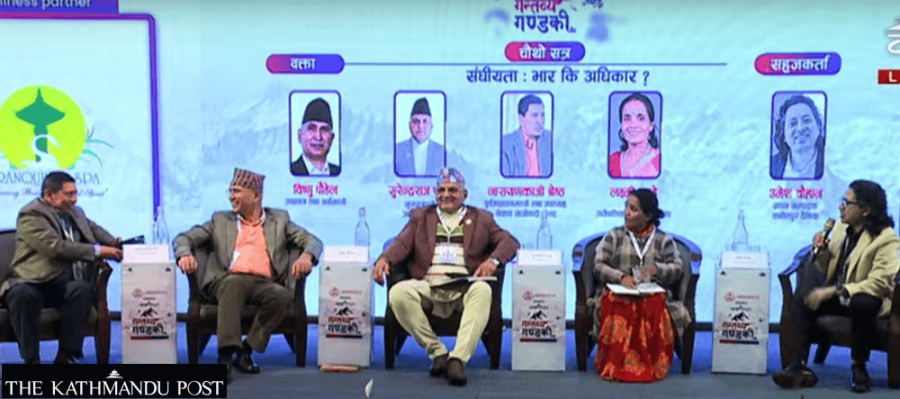National
Federalism key to progress, not a burden: Finance Minister Paudel
Leaders and experts at the ‘Gantabya Gandaki’ event call for strengthening federalism, addressing governance gaps, and investing in education, health, and employment.
Post Report
Federalism has progressed significantly in Nepal and must now be strengthened rather than questioned, said Deputy Prime Minister and Finance Minister Bishnu Prasad Paudel on Wednesday. Speaking at the final session of the ‘Gantabya Gandaki’ programme, organised by Kantipur Media Group, Paudel emphasised federalism as an opportunity, not a burden.
“Federalism is not a liability; it is our responsibility. We have achieved significant milestones in its implementation, but much remains to be done to make it fully effective. To accomplish this, we must embrace the tasks ahead with resolve,” said Paudel during the session titled ‘Federalism: Burden or Opportunity?’
Paudel reiterated that federalism was introduced to distribute powers to sub-national governments and bring governance to the local level, making it indispensable.
Chief Minister of Gandaki Province Surendra Raj Pandey, highlighted the challenges of the federal system, likening it to operating on outdated infrastructure.
“While the world has advanced to 5G, Nepal’s federalism is still functioning on the 2G stage. The system remains skeletal, lacking the limbs and brain required for effective functioning,” said Pandey. He noted that constitutional provisions on exclusive and shared rights require clarity and proper implementation to address inefficiencies.
Pandey urged the three tiers of government to collaborate and avoid conflicts over jurisdiction, warning that such disputes would undermine federalism’s potential.
Police integration crucial for federalism
Former Deputy Prime Minister and CPN (Maoist Centre) leader Narayan Kaji Shrestha underscored the need for police integration to advance federalism. Reflecting on his tenure as home minister, he shared how progress on police integration stalled due to political and procedural hurdles.
“We began the process of police integration, even forming a committee led by an undersecretary to prepare a timeline for the purpose. Unfortunately, the initiative did not progress after my tenure ended,” said Shrestha, stressing that the issue remains unresolved and hinders federalism’s full implementation.
Rapid progress in federalism implementation
Khagaraj Adhikari, former chief minister of Gandaki Province, praised Nepal’s progress in federalism compared to other nations.
“South Africa took 30 years to adapt to federalism under Nelson Mandela’s leadership. Nepal, however, has identified its path within just five or six years,” Adhikari stated during the session ‘Core Concerns: Education, Health, and Employment.’
Adhikari called for a clear division of powers and enhanced coordination among local, provincial, and federal governments. He emphasised the need for meritocracy and transparency in sensitive sectors like health and education to ensure sustainable development.
Collaborative governance essential
Laxmi Pandey, chair of the National Federation of Rural Municipalities, urged all three levels of government to adhere to constitutional mandates and work collaboratively.
“Instead of clashing over jurisdiction, governments must coordinate and support one another. Effective financial federalism is crucial to driving national development,” Pandey said.
Highlighting local achievements, Pandey noted that federalism has brought tangible improvements to infrastructure, education, and healthcare at the grassroots level. However, she cautioned against overshadowing these gains with undue criticism.
The discussions concluded with a consensus that federalism is vital to Nepal’s progress. Participants stressed the need for focused efforts to address existing challenges, ensure effective governance, and leverage federalism’s potential for sustainable development.




 9.83°C Kathmandu
9.83°C Kathmandu













